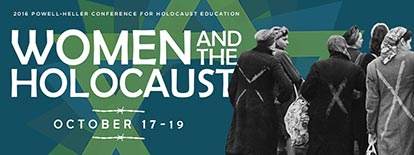Past Powell-Heller Holocaust Conferences

2016 Powell-Heller Conference for Holocaust Education
The Ninth Annual Powell-Heller Conference for Holocaust Education “Women and the Holocaust” took place Oct. 17-19.
Why study women and their experiences in the Holocaust. It was not until the 1980s that historians such as Joan Ringelheim and other academics began to ask the question “Where are the women?” in the story of the Holocaust. This conference is not an attempt to create a competition of suffering between males and females. It is merely an acknowledgement that women’s experiences, because of their gender and socialization, were simply different from men’s.
In the words of historian Myrna Goldenberg, both sexes experienced “different horrors, but the same hell.” Our conference scholars will present their latest research on women in the Holocaust — not as just victims, but as survivors, rescuers, collaborators and even as perpetrators. John Stuart Mill once wrote that the way a society treats women tells us a great deal about how civilized that society is. By exploring the position of women in the Holocaust, we are revealing what half of the world’s population experienced, thereby enhancing our understanding of the chaos and destruction that was the Holocaust.

2015 Powell-Heller Conference for Holocaust Education
The Eighth Annual Powell-Heller Conference for Holocaust Education:
The theme of the Eighth Annual Powell-Heller Conference on Holocaust Education, March 4-6, 2015, was titled “Children’s Voices, The Holocaust and Beyond.” Children of the past, present and future were the focus of the conference. Beth Kraig, faculty planning co-coordinator explained, “The conference should remind and inform audiences of the past destruction and abuse of children in the Holocaust, while provoking us all to realize that children are still heavily targeted and harmed throughout the world as a result of war, human trafficking, unaddressed poverty and other injustices.”

2014 Powell-Heller Conference for Holocaust Education
The Seventh Annual Powell-Heller Conference for Holocaust Education:
The conference highlighted the newly-approved Holocaust/Genocide Minor at PLU, Washington State Holocaust Education Resource Center teacher training and talks by Holocaust survivors. The theme for this conference was “Survivors and Rescuers.” Scholars Dr. Susannah Heschel, Dr. Hartmut Lehmann and Dr. Christopher Browning presented their latest work in this year’s theme, “Survivors & Rescuers.” Survivors included the story of the Brill family, survivors of Exodus 1947; Renee Firestone, Auschwitz survivor; and Pierre Sauvage.

2013 Powell-Heller Conference for Holocaust Education
Sixth Annual Powell-Heller Conference for Holocaust Education:
Scholar Deborah Lipstadt; Author Cara De Silva; PLU Dean of the School of Arts and Communication and pianist Dr. Cameron Bennett; PLU professor and art historian Heather Mathews and others join to present “Empowerment” a three-day conference. The Powell-Heller Conference seeks to give educators, students and community members a way to use the lessons of the Holocaust to empower themselves and those around them.

2012 Powell-Heller Conference for Holocaust Education Conference
The fifth annual Powell and Heller Holocaust Conference at PLU focused on the Nazi plunder of Jewish valuables, along with belated efforts at restitution. There was also session on German churches and universities, with speakers discussing Dietrich Bonhoeffer, the Catholic Church, and postwar denazification.

2011 Powell-Heller Conference for Holocaust Education
The forth annual Powell-Heller Holocaust Conference focused on genocide, and personal stories of those who have survived conflicts around the world, from Rwanda to the Congo.


